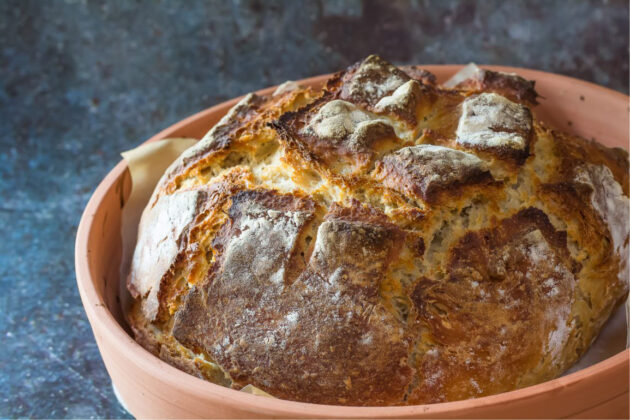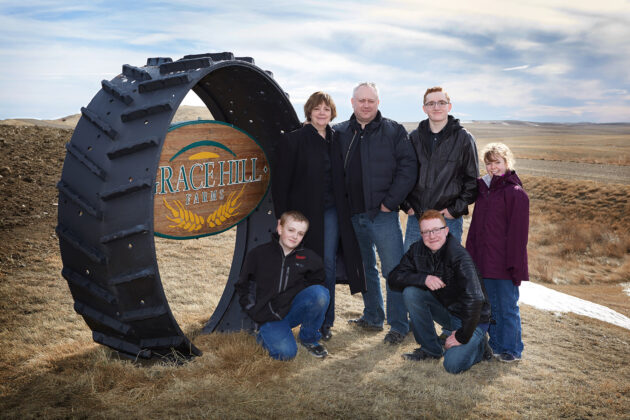
Building A Bright Future for Organic Flour and Grains
By Ardent Mills
Sponsored Content
Sponsored by Ardent Mills

A conversation with Shrene White, General Manager, Specialty Products, Ardent Mills

Introduction
Shrene White has spent her entire three-decade career working in the grain and flour milling industry, forming relationships with farmers, buying wheat for flour mills, and building out specialty programs for Ardent Mills. In her role as General Manager of The Annex by Ardent Mills, she leads a team that explores what’s next in grains and pulses, custom growing programs, R&D, and product development.

We sat down with Shrene to discuss a wide range of topics related to organic flour from an R&D perspective. From the challenges and solutions of guaranteeing consistent quality at scale in today’s thriving organic market, to the initiatives Ardent Mills has undertaken and the farmer relationships built to meet the soaring demand, and where organic flour is headed in the future.
Q: What kind of growth have you seen in the organic market over the years?
A: More people are eating organic than ever before and the category is still growing. In 2019, US organic food sales surpassed the $50 billion mark for the first time,¹ with organic grocery sales in Canada reaching $6.936 billion in 2019, a 28% increase in just two years.² Organic food products are now available throughout traditional sales channels and are gaining momentum in online and delivery channels as well. During the pandemic, this growth continued to accelerate, which is in some ways surprising, since I’ve typically seen organic foods decelerate in challenging economic times. We believe that this is the result of consumers prioritizing personal health and foods they perceive as healthful.
¹ Organic Trade Association 2020
² Canada Organic Trade Association 2019
Q: What challenges has the growth of organic wheat and flour created?
A: In the early years of Ardent Mills and our organic program, it was all about finding the organic wheat supply. As our customers have expanded and the market has grown, we have seen customers shift their focus to quality over quantity. Consistency and bake quality are key for our customers and building strong relationships with our grower partners is critical to ensure we have the right wheat for the products our customers are making. We are asking growers to make decisions today that will affect their farming operations for the next several years. This cannot be a transactional market. We need to be building relationships from the bakery all the way back to the farm.

Q: What kinds of initiatives have you been involved in to address supply challenges?
A: The Ardent Mills Organic Initiative 2019 was our stake in the ground and really showed the commitment we were making in the organic grain and flour space to both our customers and the growers that we work with each day.
Since we launched the initiative in 2014, we’ve made great strides in meeting organic demand as our customers grow in this space. In that time, we have been instrumental in doubling organic wheat acreage in North America. Across our network, we have also organic certified 8 new milling locations, 1 grain storage location, 2 mix plants and our specialty bakery, Innovative Baking Resources. In addition to these organic certified facilities, we have made investments in new assets to support growth.
Q: And how are you addressing quality and consistency?
A: It takes a lot of work to maintain our Organic System Plans (the practices and procedures used to produce organic products required for certification). Our organic mills have made commitments to our growers and customers that they will maintain the process that will allow us to accept organic wheat and produce a flour that meets final product specification.
Each year we pull organic wheat samples from our growers across Canada and the U.S. We bring these samples to our R&D facility, the Ardent Mills Innovation Center (AMIC) in Denver, CO, where they are evaluated and baked. This program allows us to target specific growing areas and farmers to purchase from, based on the needs of our customers.
Q: Tell us about a grower you work with and how they are succeeding in organic.
A: Dwayne and Doreen Smith of Grace Hill Farms are organic farmers from Mankota, SK. They have deep roots in the remote farming community, and their farm is named after a one room schoolhouse that used to be located nearby.
The Smiths are passionate about growing organic wheat and it has been their primary crop for more than 30 years. They dedicate 60-70% of their acreage to growing wheat and were early adopters of organic farming, receiving their first organic certification in 1986.
In looking at local family farmers to work with, Grace Hill Farms seemed like a perfect match for us. They presented a great opportunity to team up with a farm whose values aligned with our own. Grace Hill Farms is a valuable partner to us, and we look forward to continuing our work together as the demand for organic flour continues to grow.

Q: What’s next in terms of Ardent Mills helping grow and optimize the organic flour market?
A: Ardent Mills is a leader in the organic flour space. The commitments we’ve made have supported farmers and given our customers the confidence they need to make investments and expand in this growing market, and each year we continue to make new investments and commitments in organic. In addition to expanding our organic footprint through new grower programs, mill certifications, and acquisitions, we will continue to focus on new research priorities and additions to our product portfolio.
Q: What kinds of new products has Ardent Mills added to enhance its organic portfolio and increase options for manufacturers?
A: Our vision is to be the trusted partner in nourishing what’s next. In addition to our organic flour line: all-purpose, strong bakers, whole wheat, and pastry flour, we offer an organic pizza mix and custom organic blending opportunities. And our recent acquisition of Andean Naturals in California moved us into the gluten-free organic space and has opened the door to new organic gluten-free seeds and blends.
Q: What do you see as the future of organic wheat and grain?
A: We can expect continued growth for organic wheat and grain. Millennials and Gen Z, in particular, believe in its value and benefits, and they’re raising the children of tomorrow. It’s likely that their lifestyle choices will continue to drive increased demand for organic wheat and alternative grains and pulses. That demand will also be fueled by the continuing growth of plant-based foods. Manufacturers and bakers expect increased consistency, quality, and supply. We’re more excited than ever to be helping shape that conversation and make those changes happen.
Visit the Ardent Mills Organic Hub to learn more about sourcing organic flour today!
Print this page